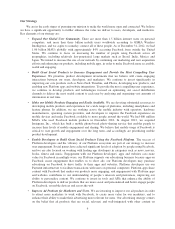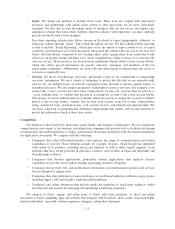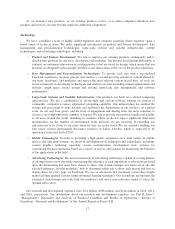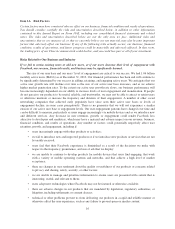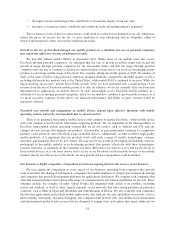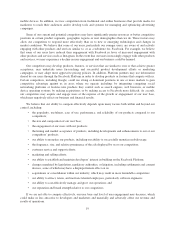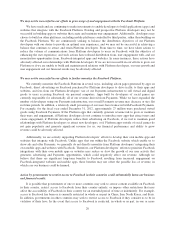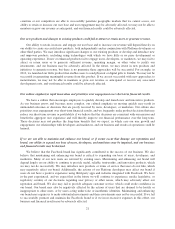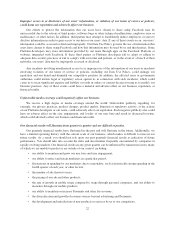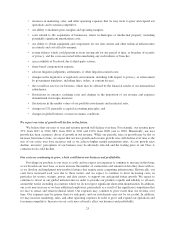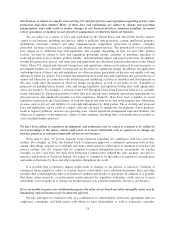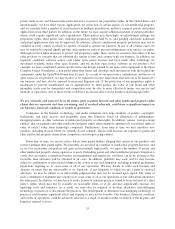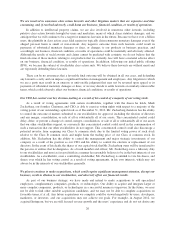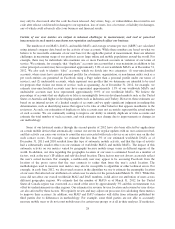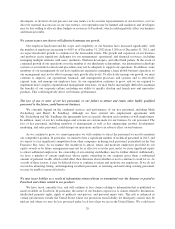Facebook 2012 Annual Report Download - page 23
Download and view the complete annual report
Please find page 23 of the 2012 Facebook annual report below. You can navigate through the pages in the report by either clicking on the pages listed below, or by using the keyword search tool below to find specific information within the annual report.mobile devices. In addition, we face competition from traditional and online businesses that provide media for
marketers to reach their audiences and/or develop tools and systems for managing and optimizing advertising
campaigns.
Some of our current and potential competitors may have significantly greater resources or better competitive
positions in certain product segments, geographic regions or user demographics than we do. These factors may
allow our competitors to respond more effectively than us to new or emerging technologies and changes in
market conditions. We believe that some of our users, particularly our younger users, are aware of and actively
engaging with other products and services similar to, or as a substitute for, Facebook. For example, we believe
that some of our users have reduced their engagement with Facebook in favor of increased engagement with
other products and services such as Instagram. In the event that our users increasingly engage with other products
and services, we may experience a decline in user engagement and our business could be harmed.
Our competitors may develop products, features, or services that are similar to ours or that achieve greater
acceptance, may undertake more far-reaching and successful product development efforts or marketing
campaigns, or may adopt more aggressive pricing policies. In addition, Platform partners may use information
shared by our users through the Facebook Platform in order to develop products or features that compete with us.
Certain competitors, including Google, could use strong or dominant positions in one or more markets to gain
competitive advantage against us in areas where we operate including: by integrating competing social
networking platforms or features into products they control such as search engines, web browsers, or mobile
device operating systems; by making acquisitions; or by making access to Facebook more difficult. As a result,
our competitors may acquire and engage users at the expense of the growth or engagement of our user base,
which may negatively affect our business and financial results.
We believe that our ability to compete effectively depends upon many factors both within and beyond our
control, including:
• the popularity, usefulness, ease of use, performance, and reliability of our products compared to our
competitors;
• the size and composition of our user base;
• the engagement of our users with our products;
• the timing and market acceptance of products, including developments and enhancements to our or our
competitors’ products;
• our ability to monetize our products, including our ability to successfully monetize mobile usage;
• the frequency, size, and relative prominence of the ads displayed by us or our competitors;
• customer service and support efforts;
• marketing and selling efforts;
• our ability to establish and maintain developers’ interest in building on the Facebook Platform;
• changes mandated by legislation, regulatory authorities, or litigation, including settlements and consent
decrees, some of which may have a disproportionate effect on us;
• acquisitions or consolidation within our industry, which may result in more formidable competitors;
• our ability to attract, retain, and motivate talented employees, particularly software engineers;
• our ability to cost-effectively manage and grow our operations; and
• our reputation and brand strength relative to our competitors.
If we are not able to compete effectively, our user base and level of user engagement may decrease, which
could make us less attractive to developers and marketers and materially and adversely affect our revenue and
results of operations.
19


